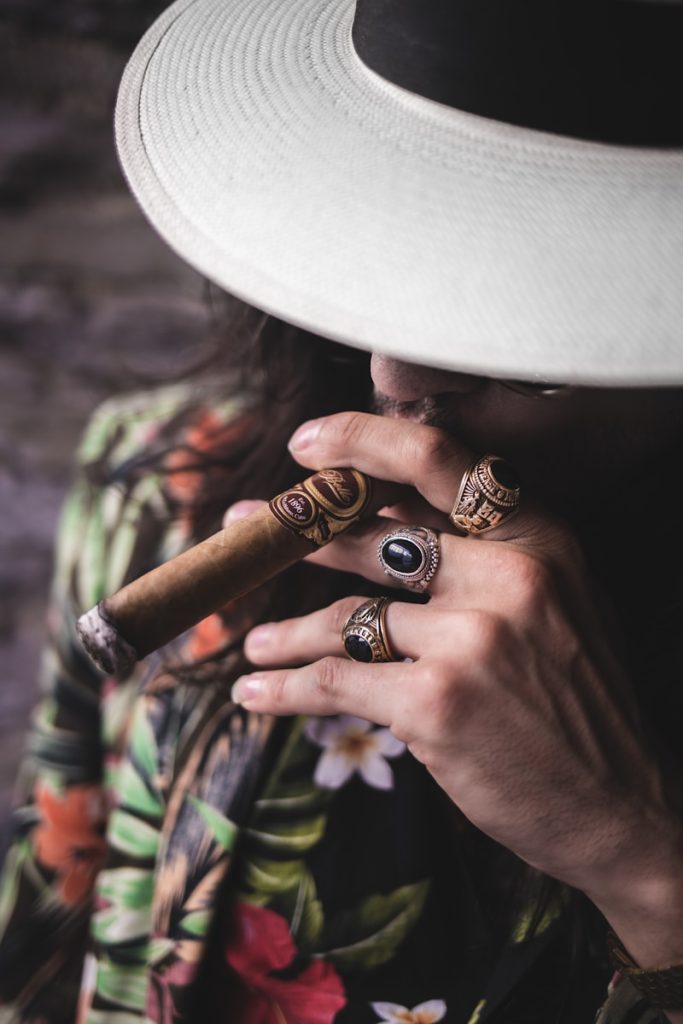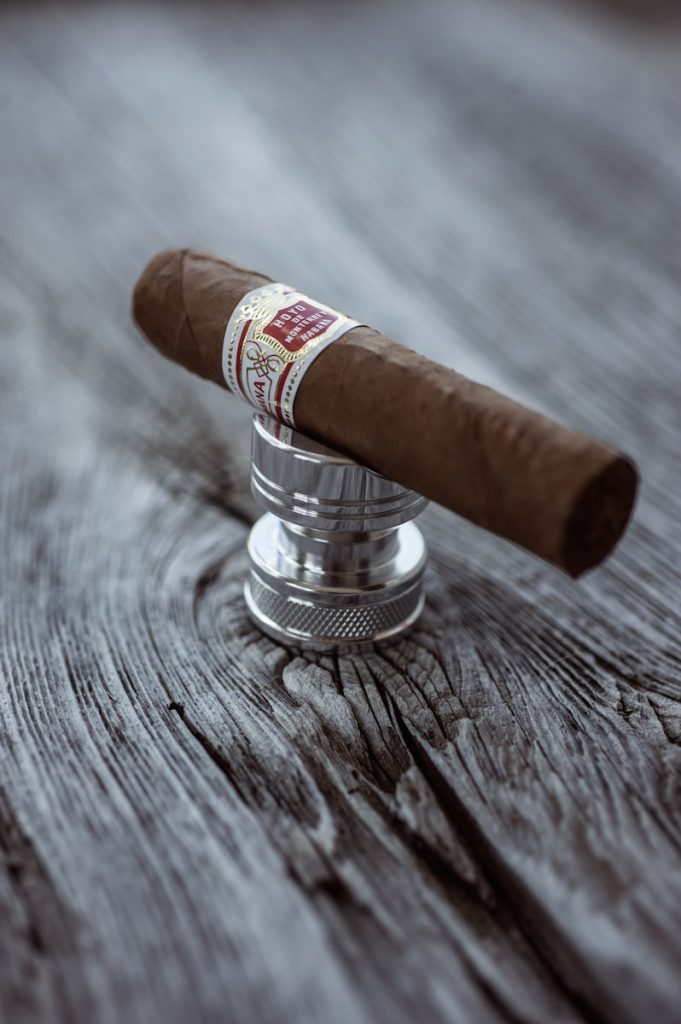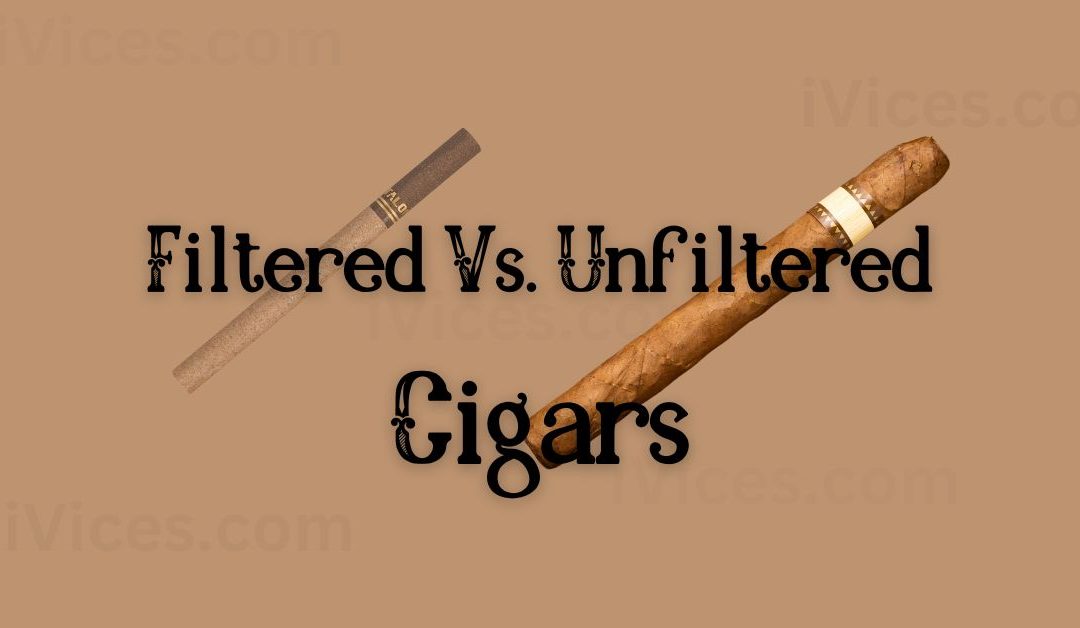If you’re curious about the world of cigars and tobacco, then understanding the difference between filtered and unfiltered cigars is a good place to start. While both may have a similar foundation of rolled tobacco leaves, it’s the presence or absence of a filter that sets them apart. Filters, often made from cellulose acetate or charcoal, are designed to reduce the intake of tar and other harmful substances, providing a milder smoke for the smoker. On the other hand, unfiltered cigars offer a more intense and robust flavor, as they allow for a direct and unobstructed draw of smoke. So, whether you’re looking for a smoother experience or a more authentic taste, this article will guide you through the nuances of filtered and unfiltered cigars.
The Basics of Cigars
Introduction
If you’ve ever been curious about cigars, you’ve come to the right place. In this article, we’ll explore the world of cigars and help you understand the ins and outs of this popular pastime. From the different types of cigars to the manufacturing process, flavor and strength variations, smoking experience, nicotine absorption, health considerations, preference and personal choice, and even price and availability, we’ll cover it all. So sit back, relax, and let’s dive into the fascinating world of cigars.
What is a cigar?
A cigar is a rolled bundle of dried and fermented tobacco leaves that is designed to be smoked. It typically consists of three main components: the filler, the binder, and the wrapper. The filler is a blend of different tobacco leaves, while the binder holds the filler together. The wrapper is the outermost layer of the cigar and gives it its appearance.

Types of cigars
Cigars come in various shapes and sizes, but they can generally be categorized into two main types: filtered cigars and unfiltered cigars. Filtered cigars have a filter at the end to reduce the amount of smoke and nicotine that reaches your mouth, while unfiltered cigars do not have a filter and allow for a more intense smoking experience.
The manufacturing process
The manufacturing process of cigars is a labor-intensive and meticulous process. It begins with the selection and curing of tobacco leaves, followed by the blending of different types of leaves to create the desired flavor profile. The blended leaves are then rolled into the desired shape and size, with the binder holding the filler together. Finally, the wrapper is applied, and the cigar is aged to enhance its flavors before being packaged and sold.
Filtered Cigars
What are filtered cigars?
Filtered cigars are cigars that have a filter at the end, similar to a cigarette. This filter is typically made of cellulose or cotton and serves the purpose of reducing the amount of smoke and nicotine that is inhaled. Filtered cigars are often marketed as being milder and more approachable than unfiltered cigars.
Purpose of filters
The main purpose of filters on cigars is to provide a smoother smoking experience. The filter helps to trap some of the tar and other harmful substances present in the smoke, reducing their intake into the body. Filters also act as a barrier for larger particles, making the smoke feel less harsh on the throat and lungs.
Advantages of filtered cigars
Filtered cigars have several advantages. Firstly, they tend to be milder and less harsh on the throat and lungs compared to unfiltered cigars. This makes them a popular choice for novice cigar smokers or those who prefer a lighter smoking experience. Secondly, the filters help to reduce the amount of smoke and nicotine that is inhaled, making them potentially less addictive. Lastly, the use of filters can also contribute to a cleaner smoking experience, as they help to trap some of the tar and other harmful substances that would otherwise be inhaled.
Disadvantages of filtered cigars
While filtered cigars have their advantages, they also come with some disadvantages. One of the main disadvantages is that the use of filters can alter the flavor profile of the cigar. Filters can trap some of the flavor compounds, resulting in a less intense and nuanced smoking experience. Additionally, the presence of a filter may not appeal to traditional cigar enthusiasts who prefer the authenticity of unfiltered cigars. Furthermore, it is important to note that even with a filter, smoking still poses health risks, and filtered cigars are no exception to this.
Unfiltered Cigars
What are unfiltered cigars?
Unfiltered cigars, as the name suggests, are cigars that do not have a filter at the end. This means that when you smoke an unfiltered cigar, you are exposed to the full concentration of smoke and nicotine without any filtration or reduction.
Why are unfiltered cigars popular?
Unfiltered cigars have a dedicated following among cigar enthusiasts who appreciate the full-bodied and robust smoking experience they offer. The absence of a filter allows for direct and intense inhalation of the smoke, resulting in a stronger and more flavorful smoking experience. Unfiltered cigars are often associated with a sense of tradition and authenticity, appealing to those who prefer a more traditional approach to cigar smoking.
Characteristics of unfiltered cigars
Unfiltered cigars are known for their rich and complex flavors. Without a filter to trap any flavor compounds, the full range of flavors from the tobacco leaves is experienced. The smoke tends to be thicker and heavier, and the nicotine hit can be more pronounced. Unfiltered cigars are often enjoyed by experienced smokers who have developed a taste for the bold and powerful flavors they offer.
Health risks associated with unfiltered cigars
It is important to note that smoking, whether filtered or unfiltered, carries health risks. Unfiltered cigars, in particular, pose an increased risk as they expose the smoker to a higher concentration of smoke and nicotine. The absence of a filter means that more harmful substances are inhaled directly into the lungs. It is essential to practice moderation and be aware of the potential health consequences when enjoying unfiltered cigars.
Flavor and Strength
Flavor differences
The flavor profile of cigars can vary significantly based on factors such as the type of tobacco used, the blending process, and the aging period. Filtered cigars, due to the presence of filters, may have a slightly milder and smoother flavor compared to unfiltered cigars. The filters can trap some of the flavor compounds, resulting in a more subdued smoking experience. On the other hand, unfiltered cigars offer a more robust and intense flavor profile, allowing the full range of flavors to be enjoyed.
Strength variations
The strength of a cigar refers to how potent it is in terms of nicotine content and overall intensity. Filtered cigars, with their reduced amount of smoke and nicotine intake, are generally considered to be milder in strength. This makes them a popular choice for those who prefer a more relaxed smoking experience or are new to cigars. Unfiltered cigars, on the other hand, tend to be stronger in both nicotine content and overall flavor. They provide a bolder and more powerful smoking experience for those who crave a stronger hit.

Smoking Experience
Draw and airflow
The draw of a cigar refers to how easily air flows through it when you take a puff. It plays a crucial role in the overall smoking experience. Filtered cigars often have a looser draw due to the presence of a filter. This can result in a smoother and easier smoking experience, as the smoke is drawn in more effortlessly. Unfiltered cigars, on the other hand, may have a tighter draw, requiring a bit more effort to inhale the smoke. This can create a more engaging and tactile experience for smokers who enjoy the process of drawing on a cigar.
Burn rate
The burn rate of a cigar refers to how quickly or slowly it burns. This can affect the overall smoking experience, as a cigar that burns too quickly may not allow you to fully enjoy its flavors, while a cigar that burns too slowly may become overly bitter or hot. Filtered cigars tend to have a more consistent and predictable burn rate due to the presence of a filter, which helps regulate the airflow and combustion. Unfiltered cigars, depending on their construction, may have a more varied burn rate, requiring more attention and occasional relighting.
Ash Quality
The ash that forms as a cigar burns can provide valuable insights into the quality of the tobacco and the construction of the cigar. Filtered cigars, due to their more regulated burn rate, often produce more compact and solid ash. This can make for a neater smoking experience, with less ash falling off. Unfiltered cigars, with their potentially more varied burn rate, may produce looser and flakier ash. Some cigar enthusiasts even consider the quality and length of the ash as indicators of the cigar’s craftsmanship.
Nicotine Absorption
Filtered cigars
Filtered cigars, as mentioned earlier, have a filter that reduces the amount of smoke and nicotine that is inhaled. This can result in lower nicotine absorption compared to unfiltered cigars. The use of filters allows for a more controlled and potentially less addictive smoking experience, making filtered cigars a popular choice for those who want to enjoy cigars in a more moderate manner.
Unfiltered cigars
With no filter to act as a barrier, unfiltered cigars expose the smoker to a higher concentration of smoke and nicotine. This can lead to a more significant nicotine absorption and a more intense physical and sensory experience. It is important to exercise caution and be mindful of the potential effects of nicotine when smoking unfiltered cigars.

Health Considerations
Filtered cigars
While filtered cigars may have some advantages in terms of reducing smoke and nicotine intake, it is crucial to remember that smoking any tobacco product carries health risks. Even with a filter, harmful substances are still present in the smoke and can be inhaled into the lungs. It is always advisable to speak with a healthcare professional and understand the potential health consequences before engaging in any form of smoking.
Unfiltered cigars
The absence of a filter in unfiltered cigars means that the smoke and nicotine are inhaled directly into the lungs, increasing exposure to harmful substances. This poses a higher health risk compared to filtered cigars. It is essential to be fully aware of the potential health consequences and make an informed decision before indulging in unfiltered cigars.
Preference and Personal Choice
Factors influencing choice
When it comes to choosing between filtered and unfiltered cigars, personal preference plays a significant role. Some factors that may influence this choice include the desired smoking experience, flavor preferences, nicotine tolerance, health considerations, and even cultural or regional influences. It is essential to explore different options, experiment with various cigars, and find what suits your individual preferences and needs.
Popular preferences
Filtered cigars are often preferred by those who enjoy a milder and smoother smoking experience. They are particularly popular among novice cigar smokers or those who prefer a lighter nicotine hit. Unfiltered cigars, on the other hand, have a dedicated following among experienced smokers who appreciate the bold and intense flavors they offer. They are often seen as a symbol of tradition and authenticity in the world of cigars.
Cultural and regional variations
Cigar preferences can also vary depending on cultural and regional influences. Certain cultures or regions may have a preference for filtered cigars, while others may lean towards unfiltered cigars. These preferences can be shaped by factors such as local cigar traditions, preferences for certain flavor profiles, or even government regulations regarding tobacco products.
Trends in the cigar industry
The cigar industry is constantly evolving, and with it comes new trends and innovations. In recent years, there has been a growing interest in artisanal and boutique cigars, with many cigar enthusiasts seeking out unique and limited-edition blends. There has also been a rise in the popularity of flavored cigars, offering smokers a wide range of flavor options to choose from. Additionally, there has been a growing awareness and emphasis on sustainable and eco-friendly practices in cigar manufacturing.
Price and Availability
Filtered cigars
Filtered cigars are generally more widely available and accessible compared to unfiltered cigars. They can be found in many convenience stores, tobacco shops, and online retailers. The price of filtered cigars can vary based on factors such as brand, quality, and flavor options. In general, filtered cigars tend to be more affordable compared to premium, hand-rolled cigars.
Unfiltered cigars
Unfiltered cigars are often considered to be a higher-end and more artisanal product. They are typically hand-rolled and made with premium tobacco. As a result, unfiltered cigars tend to be more expensive and may be harder to find compared to filtered cigars. They are often sold in specialty tobacco shops or through online retailers specializing in premium cigars.
Conclusion
Cigars offer a unique and enjoyable smoking experience for those who appreciate the craftsmanship and artistry behind them. Whether you prefer the milder and filtered variety or the bolder and unfiltered kind, the world of cigars has something to offer for every taste. However, it is essential to keep in mind the potential health risks associated with smoking and make educated choices based on personal preferences and considerations. So, next time you’re in the mood for a smoke, take a moment to explore the wide range of cigars available and find the one that suits your style and taste.
© 2024 by iVices Reserved all rights. This document cannot be copied or communicated in any way without iVices’s prior written consent, whether it be electronically, mechanically, through photocopying, recording, or another medium.

